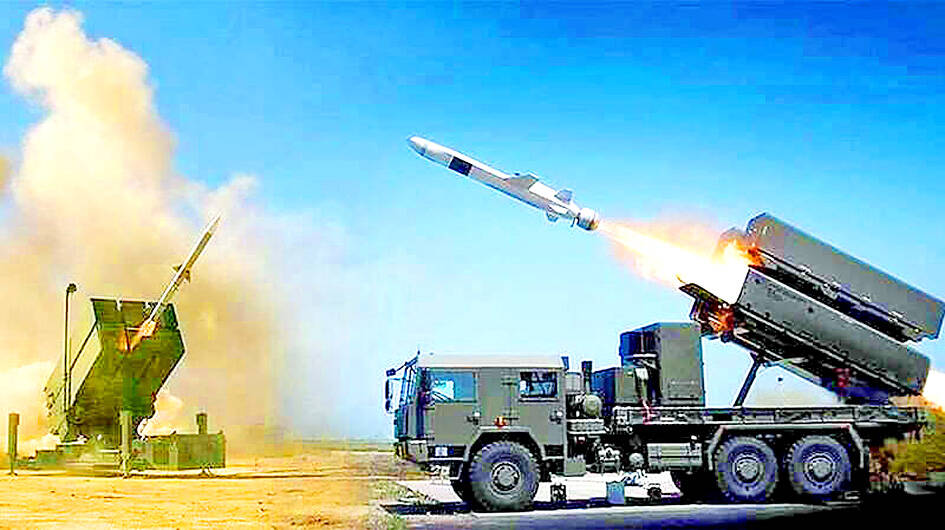Taiwan has signed a NT$24.99 billion (US$761 million) procurement contract with the US for three Norwegian Advanced Surface-to-Air Missile Systems (NASAMS) to aid air defense capabilities in northern Taiwan, the Ministry of National Defense said yesterday.
The contract was signed by the Defense Mission to the US and the American Institute in Taiwan, amounting to nearly NT$24.99 billion with a six-year time limit for contract performance that runs from Jan. 14 through Dec. 31, 2030, the ministry said in a statement published on the Government e-Procurement System yesterday.
The NASAMS would be delivered to Taipei’s Songshan District (松山) and New Taipei City’s Tamsui District (淡水), where they are expected to be deployed, it said.

Photo: screen grab from the Kongsberg Defence and Aerospace Web site
A source, who wished to remain anonymous, said that there is a chance of the first NASAMS being delivered by the end of this year.
The US Defense Security Cooperation Agency (DSCA) on Oct. 25 last year said that the US Department of State had approved three arms sales to Taiwan, including the NASAMS, an L-band AN/TPS-77 long-range radar system and an S-band AN/TPS-78 long-range radar system, which were initially projected to cost about NT$65.2 billion.
The ministry last month said that contracts for the three arms procurements would be signed and delivered by 2034.
The ministry signed four procurement contracts for NASAMS with the US which cost NT$49.3 billion, much less than the NT$65.2 billion estimated and announced by the US government, the source said.
The actual expenditure could be lower because it depends on raw material prices, production costs, order quantities and competing buyers, the source said.
As the ministry’s budget for NASAMS procurement remains classified for this fiscal year, the actual amount of the procurement would not be unveiled until the classified budget is disclosed next year, they said.
According to the DSCA, the new procurement of three NASAMS also included 123 AIM-120 advanced medium-range air-to-air missiles, which have a range of up to 50km.
The missiles would be deployed in Taipei and New Taipei City to complete the air defense capabilities in that area in addition to the Patriot Advanced Capability-3, Tien Kung (Sky Bow), Lu Chien II (Land Sword II) and AN/TWQ-1 Avenger missile systems.
The use of NASAMS would boost operational flexibility, as they are compatible with the ammunition employed by F-16 aircraft, including AIM-120 missiles and AIM-9X Block II Sidewinder missiles.

CHAOS: Iranians took to the streets playing celebratory music after reports of Khamenei’s death on Saturday, while mourners also gathered in Tehran yesterday Iranian Supreme Leader Ayatollah Ali Khamenei was killed in a major attack on Iran launched by Israel and the US, throwing the future of the Islamic republic into doubt and raising the risk of regional instability. Iranian state television and the state-run IRNA news agency announced the 86-year-old’s death early yesterday. US President Donald Trump said it gave Iranians their “greatest chance” to “take back” their country. The announcements came after a joint US and Israeli aerial bombardment that targeted Iranian military and governmental sites. Trump said the “heavy and pinpoint bombing” would continue through the week or as long

TRUST: The KMT said it respected the US’ timing and considerations, and hoped it would continue to honor its commitments to helping Taiwan bolster its defenses and deterrence US President Donald Trump is delaying a multibillion-dollar arms sale to Taiwan to ensure his visit to Beijing is successful, a New York Times report said. The weapons sales package has stalled in the US Department of State, the report said, citing US officials it did not identify. The White House has told agencies not to push forward ahead of Trump’s meeting with Chinese President Xi Jinping (習近平), it said. The two last month held a phone call to discuss trade and geopolitical flashpoints ahead of the summit. Xi raised the Taiwan issue and urged the US to handle arms sales to

State-run CPC Corp, Taiwan (CPC, 台灣中油) yesterday said that it had confirmed on Saturday night with its liquefied natural gas (LNG) and crude oil suppliers that shipments are proceeding as scheduled and that domestic supplies remain unaffected. The CPC yesterday announced the gasoline and diesel prices will rise by NT$0.2 and NT$0.4 per liter, respectively, starting Monday, citing Middle East tensions and blizzards in the eastern United States. CPC also iterated it has been reducing the proportion of crude oil imports from the Middle East and diversifying its supply sources in the past few years in response to geopolitical risks, expanding

OTHER OPTIONS: Given possible US intervention and Taiwanese counterattacks, China might opt to blockade Taiwan or take its outlying islands instead of an all-out invasion A US think tank has urged Taiwan to adopt a “hellscape” strategy that would flood the Taiwan Strait with drones and other uncrewed systems to deter invasion by China. In its report, Hellscape for Taiwan, published on Thursday, the Center for a New American Security said Taipei’s asymmetric defense approach — often described as a “porcupine strategy” — needs to evolve to keep pace with the growing capabilities of the Chinese People’s Liberation Army. The “hellscape” strategy involves saturating the air and waters around Taiwan with thousands of drones and other platforms capable of striking invading forces from multiple domains at once. Long-range